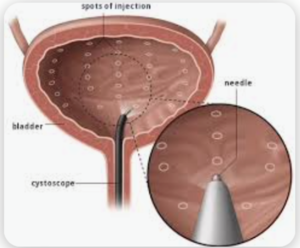CONDITIONS WE TREAT
Urinary Incontinence
At New Jersey Urogynecology, we understand that urinary incontinence can be a sensitive and challenging issue.This condition, which affects millions of women worldwide, can significantly impact your daily life and well-being. Our team is dedicated to providing personalized and effective treatments to help you manage and overcome urinary incontinence, allowing you to live a fuller, more comfortable life.
What is Urinary Incontinence?
Urinary incontinence in women can be caused by a variety of factors, including weakened pelvic floor muscles after childbirth, aging, or menopause. Hormonal changes, such as the decrease in estrogen during menopause, can also contribute to the weakening of the tissues that support the bladder. Other causes include urinary tract infections, certain medications, and chronic conditions like diabetes, obesity, and neurological disorders.
There are two main types of urinary incontinence:
- Stress Urinary Incontinence (SUI): This occurs when physical activities such as coughing, sneezing, or exercising put pressure on the bladder, causing leakage. It is often related to weakened pelvic floor muscles.
- Urge Urinary Incontinence (UUI): Also known as overactive bladder (OAB), this occurs when the bladder contracts involuntarily, causing a sudden, intense urge to urinate, even if the bladder is not full.
Urinary incontinence is the loss of bladder control, leading to the accidental leakage of urine. It is a common condition that can affect people of all ages, but it is more prevalent in women, especially as they age. Urinary incontinence can range from occasionally leaking urine when you cough or sneeze, to having an urge to urinate that’s so sudden and strong that you don’t get to the bathroom in time. This condition can be embarrassing and can interfere with daily activities, but it is treatable.
Available Treatment Options for Urinary Incontinence
At New Jersey Urogyn, we offer a range of personalized treatment options for urinary incontinence. The treatment approach differs depending on whether a patient has stress urinary incontinence (SUI) or urge urinary incontinence (UUI). Stress incontinence may be managed with pelvic floor exercises, lifestyle modifications, or low-risk procedural interventions. Urge incontinence is typically treated with behavioral therapies, medications, or procedures aimed at reducing bladder spasms and increasing bladder volume. In some cases, women have mixed incontinence, a combination of both SUI and UUI, which requires a tailored approach to treatment.
- Lifestyle Changes and Pelvic Floor Exercises: In many cases, simple changes in your daily habits can help manage urinary incontinence. This may include reducing the intake of bladder irritants like caffeine and alcohol, scheduling regular bathroom breaks, and practicing pelvic floor exercises to strengthen the muscles that control urination. Lifestyle changes and pelvic floor exercises can help improve stress urinary incontinence and OAB or urge urinary incontinence.
- Medication: Medications may be prescribed to treat the underlying causes of OAB or urge incontinence. Medications are effective 50% of the time. Medications will not treat stress urinary incontinence.
- Bulkamid® Procedure: The Bulkamid® procedure is a minimally invasive treatment option for stress urinary incontinence. It involves injecting a soft hydrogel called Bulkamid into the urethral wall to help it close more effectively, reducing or preventing urine leakage. This procedure is typically quick, with minimal discomfort, and there is no recovery or downtime.
- Mini-sling: For more severe cases of stress urinary incontinence, a mid-urethral sling is the gold-standard treatment option. With this sling, a small strip of mesh is placed under the urethra to support it and prevent urine leakage during activities like coughing or lifting.
- Bladder Botox: Bladder Botox is a treatment used to calm an overactive bladder by relaxing the muscles, which helps reduce the urge to urinate frequently. The procedure involves injecting Botox into the bladder muscle, and it can provide relief for several months before needing to be repeated.

- Sacral neuromodulation: Sacral neuromodulation is a treatment that helps control bladder function by sending gentle electrical impulses to the nerves that regulate the bladder. A small device, similar to a pacemaker, is implanted under the skin near the lower back to stimulate these nerves, which can help reduce symptoms of overactive bladder, urgency, or urinary retention.
FAQs About Urinary Incontinence
How to correct urinary incontinence?
Urinary incontinence can be managed or corrected through various methods, depending on the type of incontinence. Strengthening pelvic floor muscles through exercises like Kegels is essential for stress incontinence. Bladder training can help with urge incontinence. Pelvic floor physical therapy is helpful in guiding patients through these techniques. Managing fluid intake and avoiding certain food and beverage triggers can also improve bladder control. In many cases, low-risk procedural options are the most effective treatment for bladder leakage. Consulting with a healthcare provider is crucial for a personalized treatment plan.
Common Symptoms of Stress Urinary Incontinence (SUI):
- Leaking urine during physical activities like coughing, sneezing, or exercising
- Leaking when lifting heavy objects or bending over
- Leaking while laughing, running, or jumping
Common Symptoms of Urge Urinary Incontinence (UUI):
- Sudden, intense urge to urinate that is difficult to control
- Frequent urination that is bothersome
- Leaking urine before reaching the bathroom
Procedural treatment options:
- Bulkamid®
- Mini-sling
- Bladder botox
- Sacral neuromodulation
Take Control of Your Bladder Health Today
If you are struggling with urinary incontinence, don’t let it control your life. At New Jersey Urogyn, we offer compassionate and expert care to help you regain your confidence and improve your quality of life.
